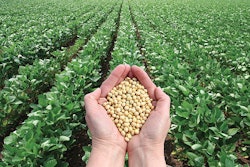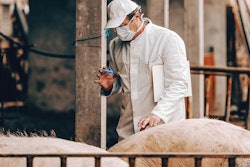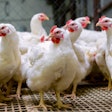
OIE: ASF a pressing issue in global animal health
With African swine fever (ASF) now affecting so many countries, the disease threatens a majority of the world’s pigs. In recognition of this risk, guidelines have been published on compartmentalization for countries aiming to establish ASF-free zones within their borders. Meanwhile, new outbreaks have been registered among domestic pigs in South Africa, and Europe’s wild boar population.
A highly contagious and severe viral disease of domestic and wild pigs, ASF has been escalating over the past couple of years in countries across sub-Saharan Africa, Europe and the Asia-Pacific region. Its virulence and high mortality have seriously and adversely impacted pig production and brought economic losses. These have threatened livelihoods, animal health and welfare, and national food security, and had knock-on effects on trade and international markets.
These make ASF a pressing issue in world animal health, according to Dr. Monique Éloit, director general of the World Organisation for Animal Health (OIE).
In recognition of the widespread risk presented by ASF, the World Assembly of OIE in 2019 recommended the establishment of a global initiative to control the disease be established.
At the same time, there was call for the OIE to develop specific guidelines on compartmentalization for ASF control.
To support countries aiming to set up and maintain a compartment free from ASF, OIE has recently published Compartmentalization Guidelines: African Swine Fever. These aim to facilitate safe national and international trade in pig products, as well as to promote disease prevention and control. OIE considers the recommendations both practical and effective.
German pork exports resume to some export markets
The concept of compartmentalized pig production has helped Germany to restore trade with some former export destinations.
As a result of high-level discussions, German pork products from ASF-free zones can be exported again to Vietnam, the federal agriculture ministry (BMEL) has announced.
This development followed Argentina, Brazil, South Africa and South Korea. These countries have also recently agreed to exemptions from the full export ban for treated/processed pork products or pork products.
Previously, Singapore agreed to the regionalization, while Bosnia-Herzegovina and Canada are also now importing fresh pork from ASF-free areas of Germany. BMEL reports that Thailand has undertaken not to extend a three-month ban on imports of German pig meat. Negotiations are continuing apace at the highest level to restore trade with China.
After confirmation of the first outbreaks of ASF in wild boar in Germany in 2020, several countries banned imports of pig meat from the whole country. This is despite no cases of the disease among the nation’s domestic pigs.
As the regionalization concept is accepted in the European Union, German pork trade to this region has continued uninterrupted.
Germany: preventive cull of rare breed herd, spreads to wild boar in new district
Because of the risk of ASF, a herd of rare breed pigs will be culled in the eastern state of Brandenburg, reports RBB24. On the very edge of the risk zone for ASF, the organic Gut Hirschaue farm is located in the Oder-Spree district. Around 80 pigs — wild-domestic pigs of long lineage — are scheduled to be culled as part of the nation’s ASF control procedures.
According to the farmer, there has been no chance of any wild boar gaining access to his herd, which are protected by a double electric fence inside the boundary of the property. To keep the pigs housed is not a practical option, he said. The animals are part of a larger organic farming system at Gut Hirschaue, and their cull puts seven local jobs risk.
Culling this herd is not justified, according to a local scientist. He told RBB24 that it was based on the very small risk that one of the pigs would come into contact with part of an ASF-infected wild boar carcass dropped by a wild bird.
Also in Brandenburg, the first case of ASF in wild boar has been confirmed in the city of Frankfurt (Oder). Just last week, there was a first outbreak in Dahme-Spreewald. The number of districts in this state registering one or more cases now stands at five. As of March 5, Brandenburg’s total has reached 723, according to the agriculture ministry for the state. This is an increase of 55 cases since February 19.
For the only other German state to have registered ASF cases in wild boar — Saxony — total cases have risen by 14 to 56 (as of March 5), reports the agriculture ministry. All infected animals have been found in the district of Görlitz.
Latest cases bring the German total to 779 animals since the disease first struck the country in September 2020.
Other ASF developments in Europe
So far this year, Poland’s chief veterinary office has reported 662 ASF outbreaks in wild boar.
Reports over the past week — covering cases suspected in the period January 26 to February 24 — list 102 outbreaks involving 204 wild boar in Poland. Recent cases occurred in seven provinces. In the west of Poland and bordering Germany, Lubusz continues to the worst-affected province. It has registered 407 outbreaks since the start of 2021.
So far, the United Kingdom has remained free of ASF. Aiming to maintain this status, the Animal and Plant Health Agency (APHA) has coordinated an information campaign, including posters in high-risk areas.
In addition, a pilot scheme has been set up in the Forest of Dean in Gloucestershire to test for ASF in wild boar. According to a veterinary adviser’s blog, wild boar found dead in the area are now being tested for ASF. As an infection with the ASF virus in naïve populations almost always leads to early mortality, this is thought to be a useful means of monitoring for the disease. If this surveillance method is successful, the scheme will be extended across Great Britain.
ASF outbreaks confirmed in pigs in South Africa’s Western Cape
Two outbreaks of ASF were confirmed in mid-February in Western Cape Province.
Affected were herds of 49 and 120 pigs at premises near Mfuleni. According to the official report to the OIE, 20 of these animals died and eight were slaughtered. Fate of the other pigs is not recorded.
According to a joint statement from the Department of Agriculture, Land Reform and Rural Development and Western Cape Government, pig sales and movements in the area on Mfuleni are banned. Source of these latest infections was uncertain. The provincial veterinary service was carrying out a survey to ascertain the extent of the problem.
The same source records that provinces outside the nation’s ASF controlled area affected by ASF since 2019 have been Mpumalanga, Gauteng, Free State, North West, Northern Cape and the Eastern Cape.
So far this year, there have been several outbreaks in Gauteng. A recent one in the North West Province that was likely the result of contact with a wild warthog.
View our continuing coverage of the global African swine fever situation.

















